Analyzing the Argument: Is Schooling Corrupting Education?
VerifiedAdded on 2020/05/16
|15
|4656
|98
Essay
AI Summary
This essay critically examines the contentious issue of whether the schooling system, in its traditional and modern forms, is corrupting education. It delves into the historical significance of schools as institutions of knowledge and the arguments positing their detrimental effects. The paper explores the rise of charter schools, their impact on public education, and the financial motivations driving their proliferation. It also discusses the implications of cyber schooling and its effects on students' learning experiences. The essay analyzes various perspectives, including those of child education specialists, scholars, and parents, weighing the pros and cons of both sides to offer a comprehensive understanding of the debate.
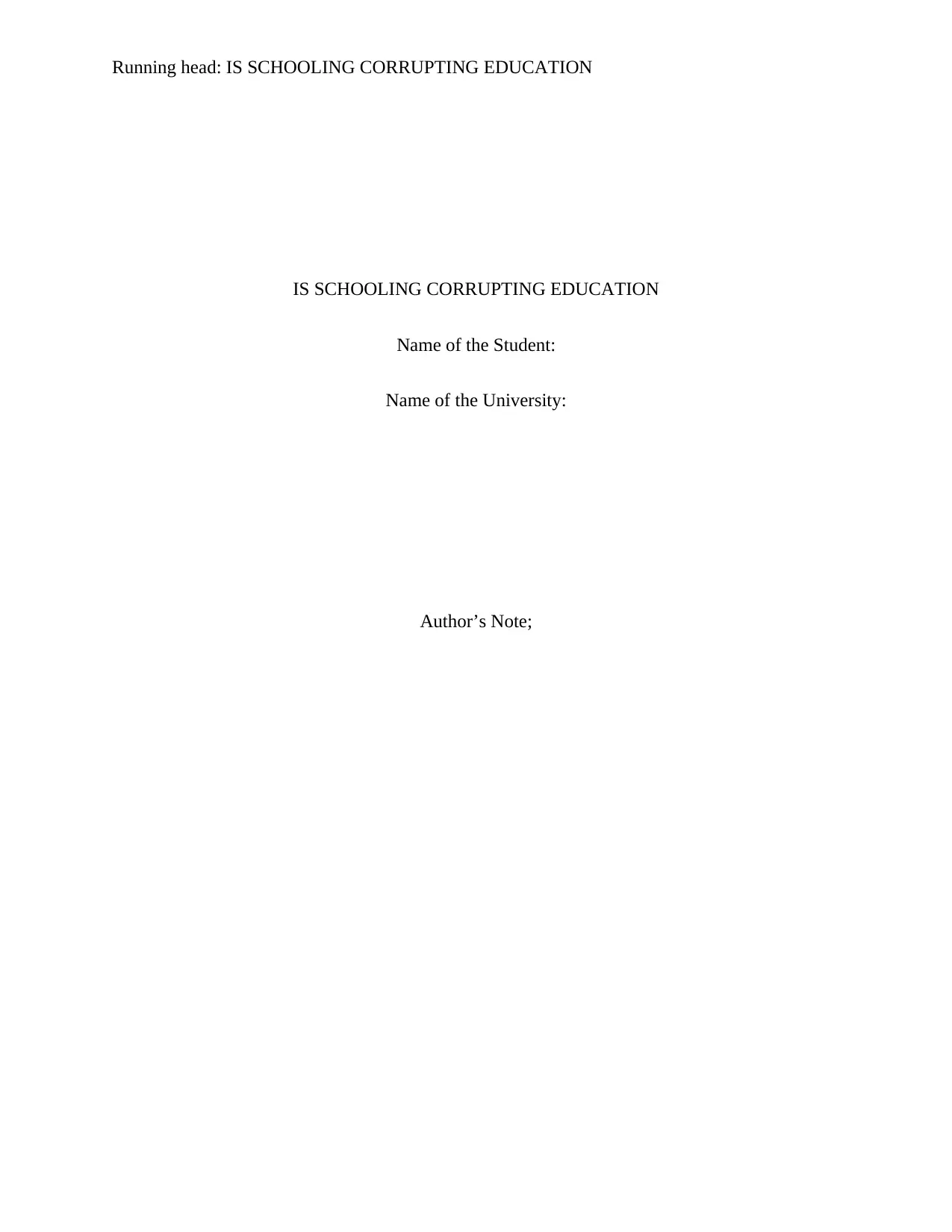
Running head: IS SCHOOLING CORRUPTING EDUCATION
IS SCHOOLING CORRUPTING EDUCATION
Name of the Student:
Name of the University:
Author’s Note;
IS SCHOOLING CORRUPTING EDUCATION
Name of the Student:
Name of the University:
Author’s Note;
Paraphrase This Document
Need a fresh take? Get an instant paraphrase of this document with our AI Paraphraser
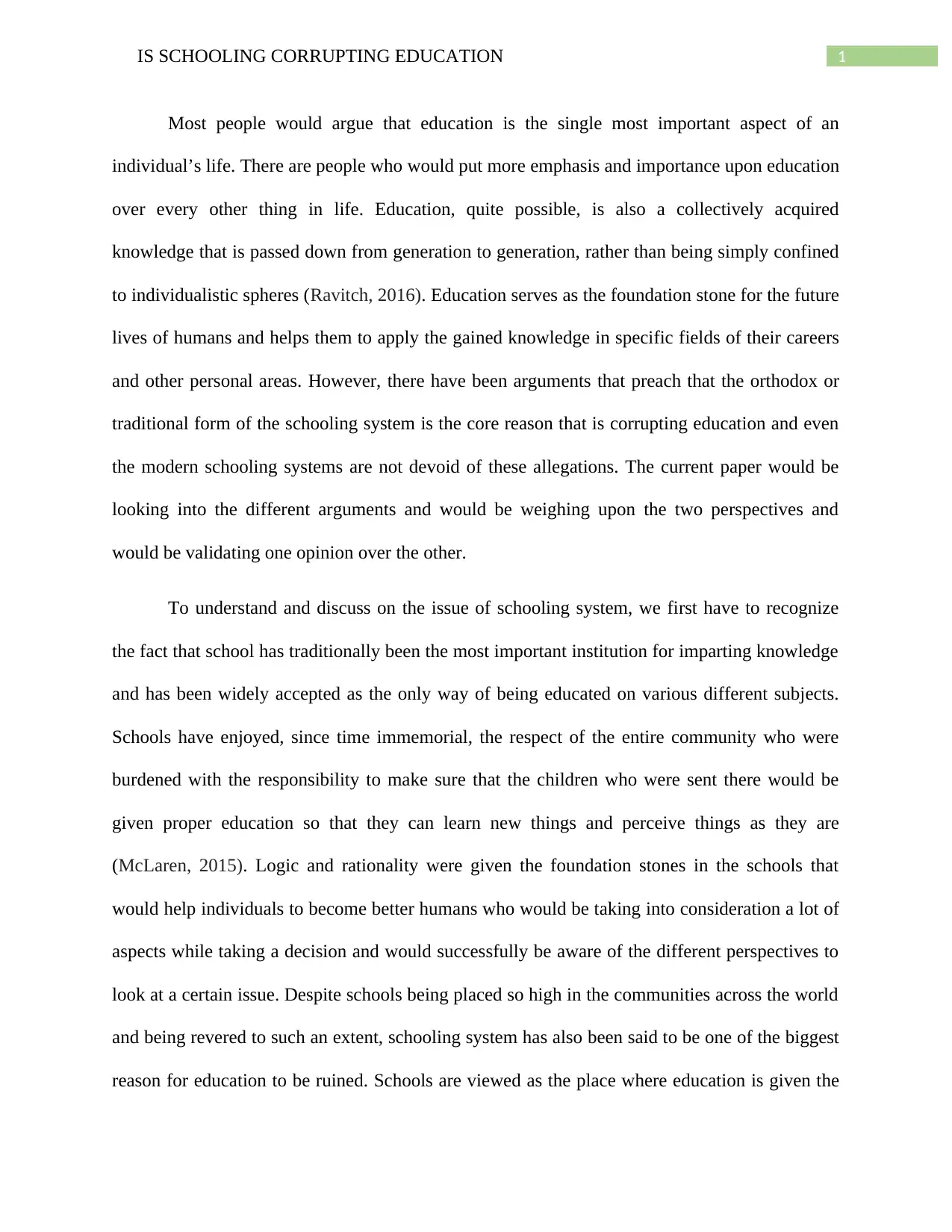
1IS SCHOOLING CORRUPTING EDUCATION
Most people would argue that education is the single most important aspect of an
individual’s life. There are people who would put more emphasis and importance upon education
over every other thing in life. Education, quite possible, is also a collectively acquired
knowledge that is passed down from generation to generation, rather than being simply confined
to individualistic spheres (Ravitch, 2016). Education serves as the foundation stone for the future
lives of humans and helps them to apply the gained knowledge in specific fields of their careers
and other personal areas. However, there have been arguments that preach that the orthodox or
traditional form of the schooling system is the core reason that is corrupting education and even
the modern schooling systems are not devoid of these allegations. The current paper would be
looking into the different arguments and would be weighing upon the two perspectives and
would be validating one opinion over the other.
To understand and discuss on the issue of schooling system, we first have to recognize
the fact that school has traditionally been the most important institution for imparting knowledge
and has been widely accepted as the only way of being educated on various different subjects.
Schools have enjoyed, since time immemorial, the respect of the entire community who were
burdened with the responsibility to make sure that the children who were sent there would be
given proper education so that they can learn new things and perceive things as they are
(McLaren, 2015). Logic and rationality were given the foundation stones in the schools that
would help individuals to become better humans who would be taking into consideration a lot of
aspects while taking a decision and would successfully be aware of the different perspectives to
look at a certain issue. Despite schools being placed so high in the communities across the world
and being revered to such an extent, schooling system has also been said to be one of the biggest
reason for education to be ruined. Schools are viewed as the place where education is given the
Most people would argue that education is the single most important aspect of an
individual’s life. There are people who would put more emphasis and importance upon education
over every other thing in life. Education, quite possible, is also a collectively acquired
knowledge that is passed down from generation to generation, rather than being simply confined
to individualistic spheres (Ravitch, 2016). Education serves as the foundation stone for the future
lives of humans and helps them to apply the gained knowledge in specific fields of their careers
and other personal areas. However, there have been arguments that preach that the orthodox or
traditional form of the schooling system is the core reason that is corrupting education and even
the modern schooling systems are not devoid of these allegations. The current paper would be
looking into the different arguments and would be weighing upon the two perspectives and
would be validating one opinion over the other.
To understand and discuss on the issue of schooling system, we first have to recognize
the fact that school has traditionally been the most important institution for imparting knowledge
and has been widely accepted as the only way of being educated on various different subjects.
Schools have enjoyed, since time immemorial, the respect of the entire community who were
burdened with the responsibility to make sure that the children who were sent there would be
given proper education so that they can learn new things and perceive things as they are
(McLaren, 2015). Logic and rationality were given the foundation stones in the schools that
would help individuals to become better humans who would be taking into consideration a lot of
aspects while taking a decision and would successfully be aware of the different perspectives to
look at a certain issue. Despite schools being placed so high in the communities across the world
and being revered to such an extent, schooling system has also been said to be one of the biggest
reason for education to be ruined. Schools are viewed as the place where education is given the
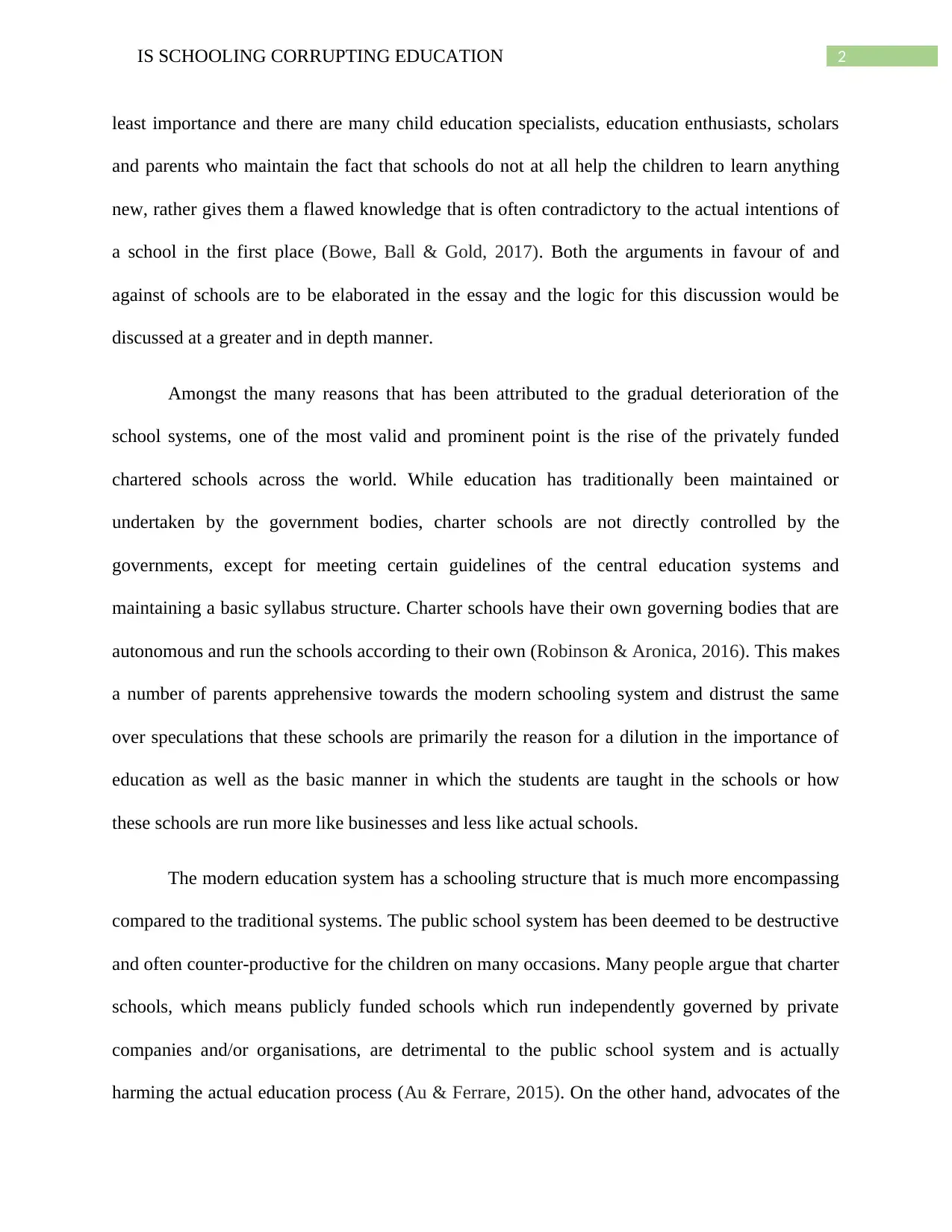
2IS SCHOOLING CORRUPTING EDUCATION
least importance and there are many child education specialists, education enthusiasts, scholars
and parents who maintain the fact that schools do not at all help the children to learn anything
new, rather gives them a flawed knowledge that is often contradictory to the actual intentions of
a school in the first place (Bowe, Ball & Gold, 2017). Both the arguments in favour of and
against of schools are to be elaborated in the essay and the logic for this discussion would be
discussed at a greater and in depth manner.
Amongst the many reasons that has been attributed to the gradual deterioration of the
school systems, one of the most valid and prominent point is the rise of the privately funded
chartered schools across the world. While education has traditionally been maintained or
undertaken by the government bodies, charter schools are not directly controlled by the
governments, except for meeting certain guidelines of the central education systems and
maintaining a basic syllabus structure. Charter schools have their own governing bodies that are
autonomous and run the schools according to their own (Robinson & Aronica, 2016). This makes
a number of parents apprehensive towards the modern schooling system and distrust the same
over speculations that these schools are primarily the reason for a dilution in the importance of
education as well as the basic manner in which the students are taught in the schools or how
these schools are run more like businesses and less like actual schools.
The modern education system has a schooling structure that is much more encompassing
compared to the traditional systems. The public school system has been deemed to be destructive
and often counter-productive for the children on many occasions. Many people argue that charter
schools, which means publicly funded schools which run independently governed by private
companies and/or organisations, are detrimental to the public school system and is actually
harming the actual education process (Au & Ferrare, 2015). On the other hand, advocates of the
least importance and there are many child education specialists, education enthusiasts, scholars
and parents who maintain the fact that schools do not at all help the children to learn anything
new, rather gives them a flawed knowledge that is often contradictory to the actual intentions of
a school in the first place (Bowe, Ball & Gold, 2017). Both the arguments in favour of and
against of schools are to be elaborated in the essay and the logic for this discussion would be
discussed at a greater and in depth manner.
Amongst the many reasons that has been attributed to the gradual deterioration of the
school systems, one of the most valid and prominent point is the rise of the privately funded
chartered schools across the world. While education has traditionally been maintained or
undertaken by the government bodies, charter schools are not directly controlled by the
governments, except for meeting certain guidelines of the central education systems and
maintaining a basic syllabus structure. Charter schools have their own governing bodies that are
autonomous and run the schools according to their own (Robinson & Aronica, 2016). This makes
a number of parents apprehensive towards the modern schooling system and distrust the same
over speculations that these schools are primarily the reason for a dilution in the importance of
education as well as the basic manner in which the students are taught in the schools or how
these schools are run more like businesses and less like actual schools.
The modern education system has a schooling structure that is much more encompassing
compared to the traditional systems. The public school system has been deemed to be destructive
and often counter-productive for the children on many occasions. Many people argue that charter
schools, which means publicly funded schools which run independently governed by private
companies and/or organisations, are detrimental to the public school system and is actually
harming the actual education process (Au & Ferrare, 2015). On the other hand, advocates of the
⊘ This is a preview!⊘
Do you want full access?
Subscribe today to unlock all pages.

Trusted by 1+ million students worldwide
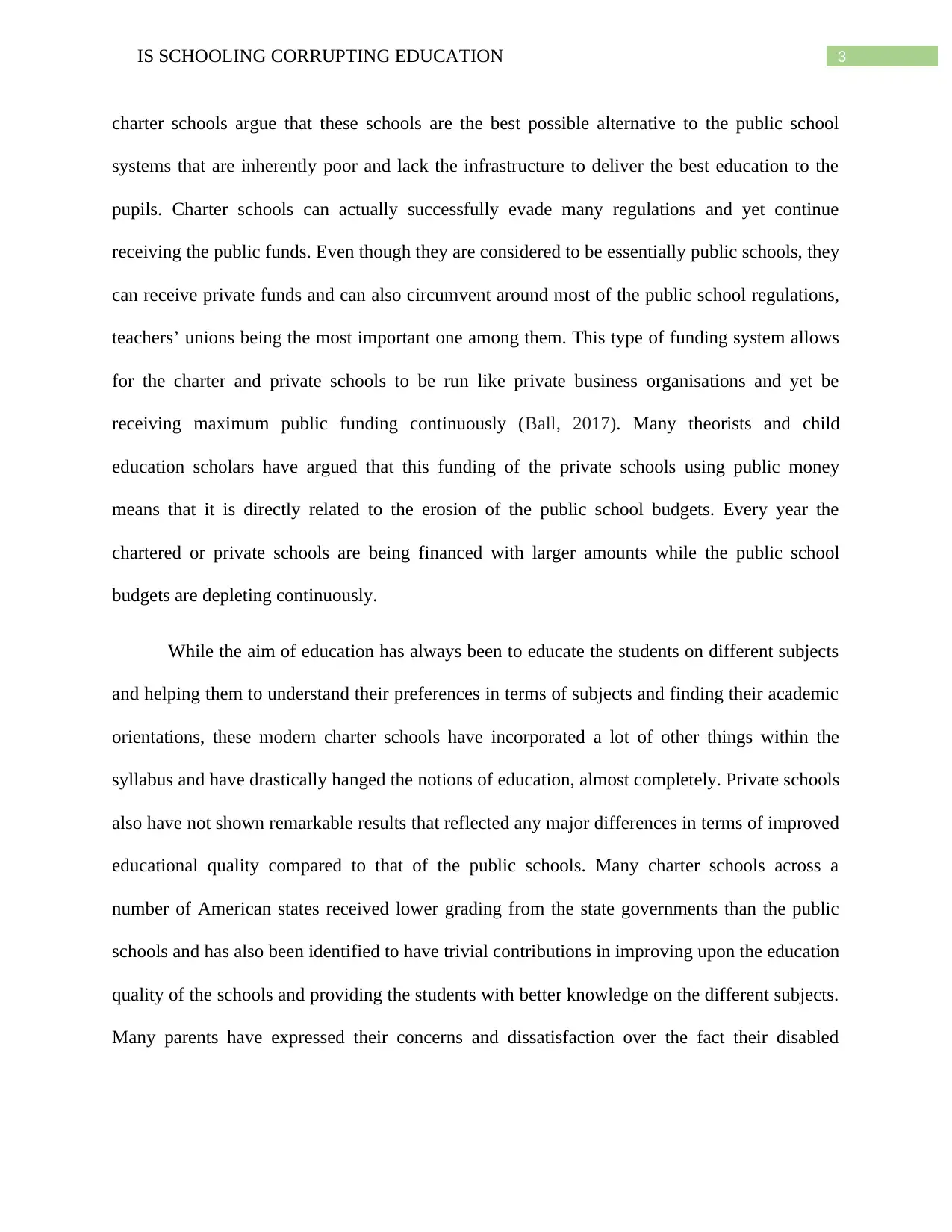
3IS SCHOOLING CORRUPTING EDUCATION
charter schools argue that these schools are the best possible alternative to the public school
systems that are inherently poor and lack the infrastructure to deliver the best education to the
pupils. Charter schools can actually successfully evade many regulations and yet continue
receiving the public funds. Even though they are considered to be essentially public schools, they
can receive private funds and can also circumvent around most of the public school regulations,
teachers’ unions being the most important one among them. This type of funding system allows
for the charter and private schools to be run like private business organisations and yet be
receiving maximum public funding continuously (Ball, 2017). Many theorists and child
education scholars have argued that this funding of the private schools using public money
means that it is directly related to the erosion of the public school budgets. Every year the
chartered or private schools are being financed with larger amounts while the public school
budgets are depleting continuously.
While the aim of education has always been to educate the students on different subjects
and helping them to understand their preferences in terms of subjects and finding their academic
orientations, these modern charter schools have incorporated a lot of other things within the
syllabus and have drastically hanged the notions of education, almost completely. Private schools
also have not shown remarkable results that reflected any major differences in terms of improved
educational quality compared to that of the public schools. Many charter schools across a
number of American states received lower grading from the state governments than the public
schools and has also been identified to have trivial contributions in improving upon the education
quality of the schools and providing the students with better knowledge on the different subjects.
Many parents have expressed their concerns and dissatisfaction over the fact their disabled
charter schools argue that these schools are the best possible alternative to the public school
systems that are inherently poor and lack the infrastructure to deliver the best education to the
pupils. Charter schools can actually successfully evade many regulations and yet continue
receiving the public funds. Even though they are considered to be essentially public schools, they
can receive private funds and can also circumvent around most of the public school regulations,
teachers’ unions being the most important one among them. This type of funding system allows
for the charter and private schools to be run like private business organisations and yet be
receiving maximum public funding continuously (Ball, 2017). Many theorists and child
education scholars have argued that this funding of the private schools using public money
means that it is directly related to the erosion of the public school budgets. Every year the
chartered or private schools are being financed with larger amounts while the public school
budgets are depleting continuously.
While the aim of education has always been to educate the students on different subjects
and helping them to understand their preferences in terms of subjects and finding their academic
orientations, these modern charter schools have incorporated a lot of other things within the
syllabus and have drastically hanged the notions of education, almost completely. Private schools
also have not shown remarkable results that reflected any major differences in terms of improved
educational quality compared to that of the public schools. Many charter schools across a
number of American states received lower grading from the state governments than the public
schools and has also been identified to have trivial contributions in improving upon the education
quality of the schools and providing the students with better knowledge on the different subjects.
Many parents have expressed their concerns and dissatisfaction over the fact their disabled
Paraphrase This Document
Need a fresh take? Get an instant paraphrase of this document with our AI Paraphraser
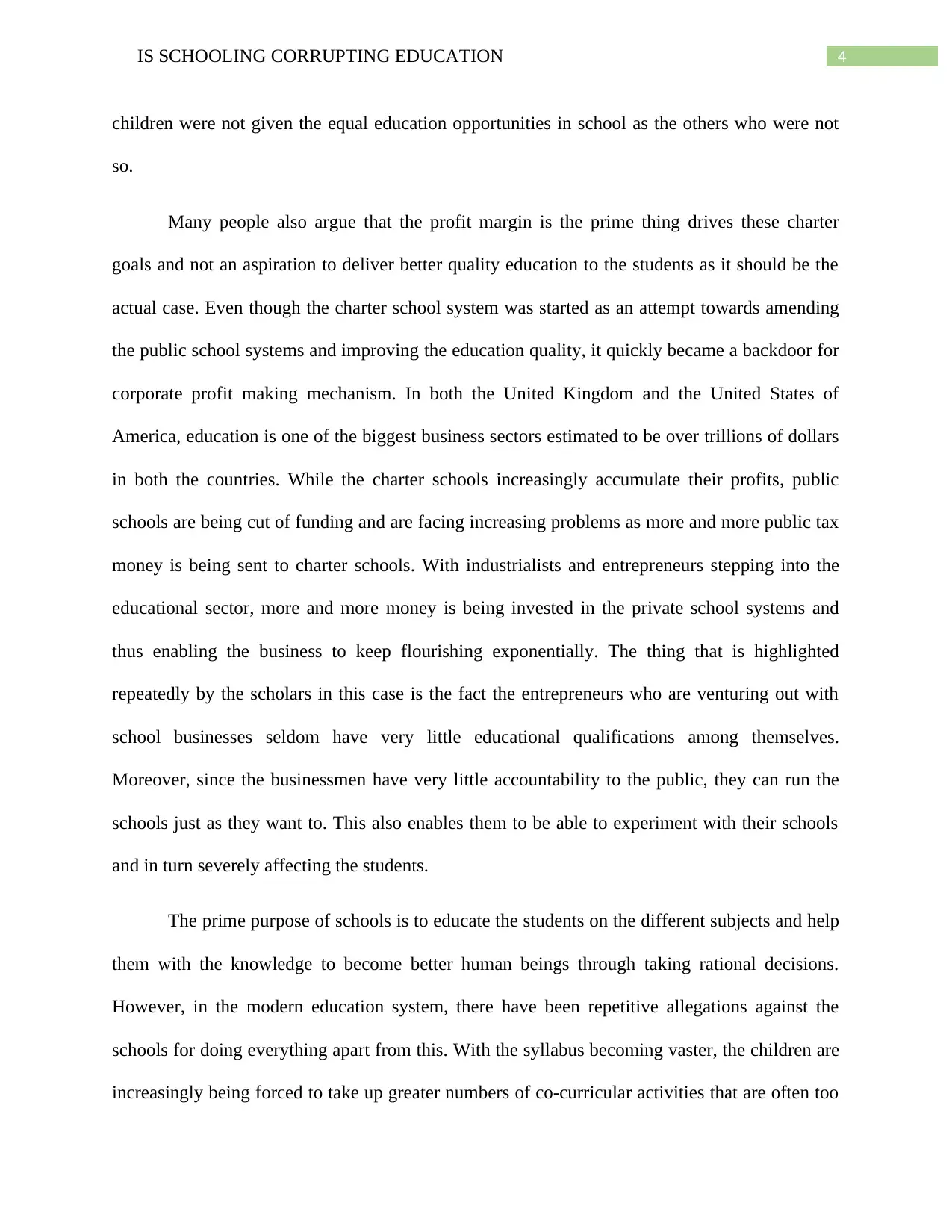
4IS SCHOOLING CORRUPTING EDUCATION
children were not given the equal education opportunities in school as the others who were not
so.
Many people also argue that the profit margin is the prime thing drives these charter
goals and not an aspiration to deliver better quality education to the students as it should be the
actual case. Even though the charter school system was started as an attempt towards amending
the public school systems and improving the education quality, it quickly became a backdoor for
corporate profit making mechanism. In both the United Kingdom and the United States of
America, education is one of the biggest business sectors estimated to be over trillions of dollars
in both the countries. While the charter schools increasingly accumulate their profits, public
schools are being cut of funding and are facing increasing problems as more and more public tax
money is being sent to charter schools. With industrialists and entrepreneurs stepping into the
educational sector, more and more money is being invested in the private school systems and
thus enabling the business to keep flourishing exponentially. The thing that is highlighted
repeatedly by the scholars in this case is the fact the entrepreneurs who are venturing out with
school businesses seldom have very little educational qualifications among themselves.
Moreover, since the businessmen have very little accountability to the public, they can run the
schools just as they want to. This also enables them to be able to experiment with their schools
and in turn severely affecting the students.
The prime purpose of schools is to educate the students on the different subjects and help
them with the knowledge to become better human beings through taking rational decisions.
However, in the modern education system, there have been repetitive allegations against the
schools for doing everything apart from this. With the syllabus becoming vaster, the children are
increasingly being forced to take up greater numbers of co-curricular activities that are often too
children were not given the equal education opportunities in school as the others who were not
so.
Many people also argue that the profit margin is the prime thing drives these charter
goals and not an aspiration to deliver better quality education to the students as it should be the
actual case. Even though the charter school system was started as an attempt towards amending
the public school systems and improving the education quality, it quickly became a backdoor for
corporate profit making mechanism. In both the United Kingdom and the United States of
America, education is one of the biggest business sectors estimated to be over trillions of dollars
in both the countries. While the charter schools increasingly accumulate their profits, public
schools are being cut of funding and are facing increasing problems as more and more public tax
money is being sent to charter schools. With industrialists and entrepreneurs stepping into the
educational sector, more and more money is being invested in the private school systems and
thus enabling the business to keep flourishing exponentially. The thing that is highlighted
repeatedly by the scholars in this case is the fact the entrepreneurs who are venturing out with
school businesses seldom have very little educational qualifications among themselves.
Moreover, since the businessmen have very little accountability to the public, they can run the
schools just as they want to. This also enables them to be able to experiment with their schools
and in turn severely affecting the students.
The prime purpose of schools is to educate the students on the different subjects and help
them with the knowledge to become better human beings through taking rational decisions.
However, in the modern education system, there have been repetitive allegations against the
schools for doing everything apart from this. With the syllabus becoming vaster, the children are
increasingly being forced to take up greater numbers of co-curricular activities that are often too
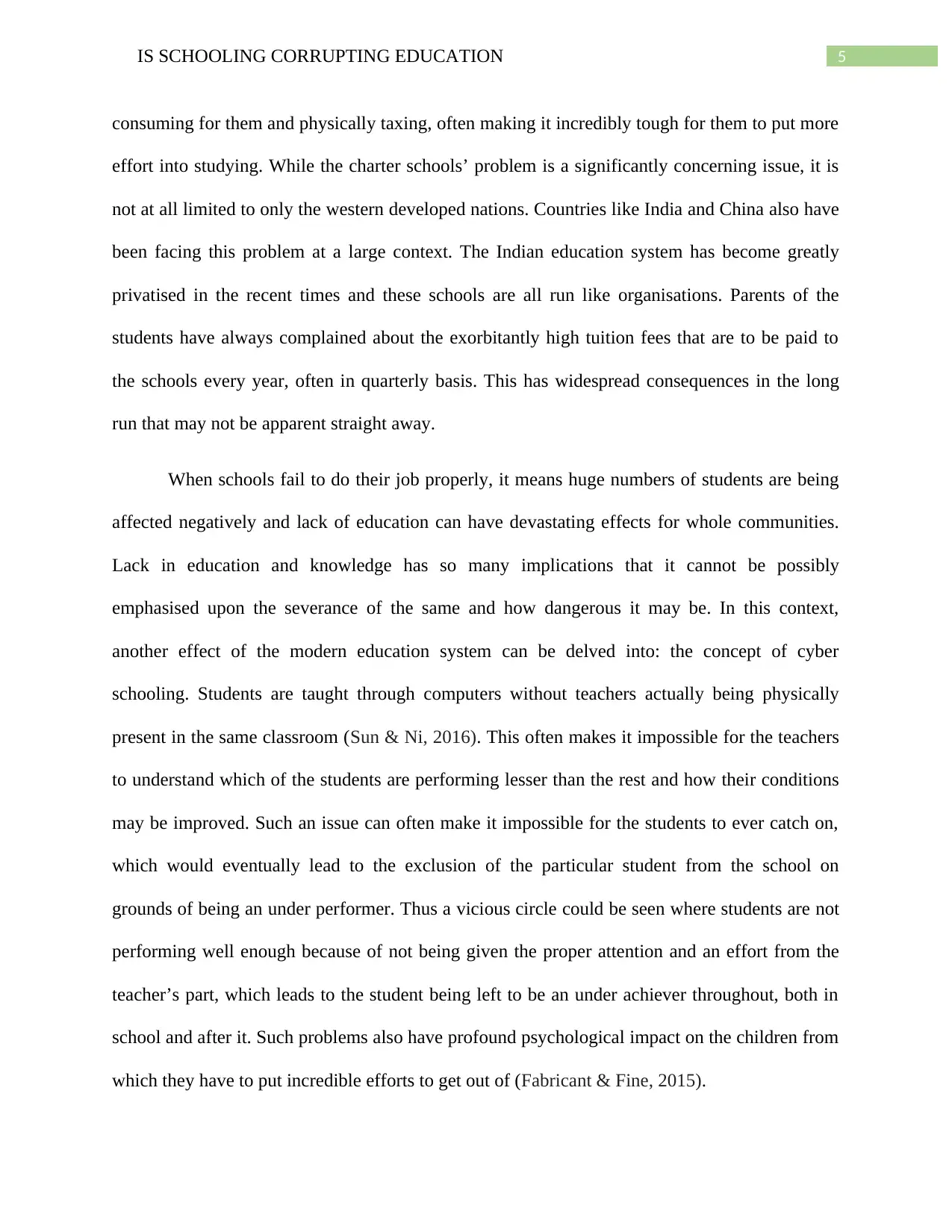
5IS SCHOOLING CORRUPTING EDUCATION
consuming for them and physically taxing, often making it incredibly tough for them to put more
effort into studying. While the charter schools’ problem is a significantly concerning issue, it is
not at all limited to only the western developed nations. Countries like India and China also have
been facing this problem at a large context. The Indian education system has become greatly
privatised in the recent times and these schools are all run like organisations. Parents of the
students have always complained about the exorbitantly high tuition fees that are to be paid to
the schools every year, often in quarterly basis. This has widespread consequences in the long
run that may not be apparent straight away.
When schools fail to do their job properly, it means huge numbers of students are being
affected negatively and lack of education can have devastating effects for whole communities.
Lack in education and knowledge has so many implications that it cannot be possibly
emphasised upon the severance of the same and how dangerous it may be. In this context,
another effect of the modern education system can be delved into: the concept of cyber
schooling. Students are taught through computers without teachers actually being physically
present in the same classroom (Sun & Ni, 2016). This often makes it impossible for the teachers
to understand which of the students are performing lesser than the rest and how their conditions
may be improved. Such an issue can often make it impossible for the students to ever catch on,
which would eventually lead to the exclusion of the particular student from the school on
grounds of being an under performer. Thus a vicious circle could be seen where students are not
performing well enough because of not being given the proper attention and an effort from the
teacher’s part, which leads to the student being left to be an under achiever throughout, both in
school and after it. Such problems also have profound psychological impact on the children from
which they have to put incredible efforts to get out of (Fabricant & Fine, 2015).
consuming for them and physically taxing, often making it incredibly tough for them to put more
effort into studying. While the charter schools’ problem is a significantly concerning issue, it is
not at all limited to only the western developed nations. Countries like India and China also have
been facing this problem at a large context. The Indian education system has become greatly
privatised in the recent times and these schools are all run like organisations. Parents of the
students have always complained about the exorbitantly high tuition fees that are to be paid to
the schools every year, often in quarterly basis. This has widespread consequences in the long
run that may not be apparent straight away.
When schools fail to do their job properly, it means huge numbers of students are being
affected negatively and lack of education can have devastating effects for whole communities.
Lack in education and knowledge has so many implications that it cannot be possibly
emphasised upon the severance of the same and how dangerous it may be. In this context,
another effect of the modern education system can be delved into: the concept of cyber
schooling. Students are taught through computers without teachers actually being physically
present in the same classroom (Sun & Ni, 2016). This often makes it impossible for the teachers
to understand which of the students are performing lesser than the rest and how their conditions
may be improved. Such an issue can often make it impossible for the students to ever catch on,
which would eventually lead to the exclusion of the particular student from the school on
grounds of being an under performer. Thus a vicious circle could be seen where students are not
performing well enough because of not being given the proper attention and an effort from the
teacher’s part, which leads to the student being left to be an under achiever throughout, both in
school and after it. Such problems also have profound psychological impact on the children from
which they have to put incredible efforts to get out of (Fabricant & Fine, 2015).
⊘ This is a preview!⊘
Do you want full access?
Subscribe today to unlock all pages.

Trusted by 1+ million students worldwide
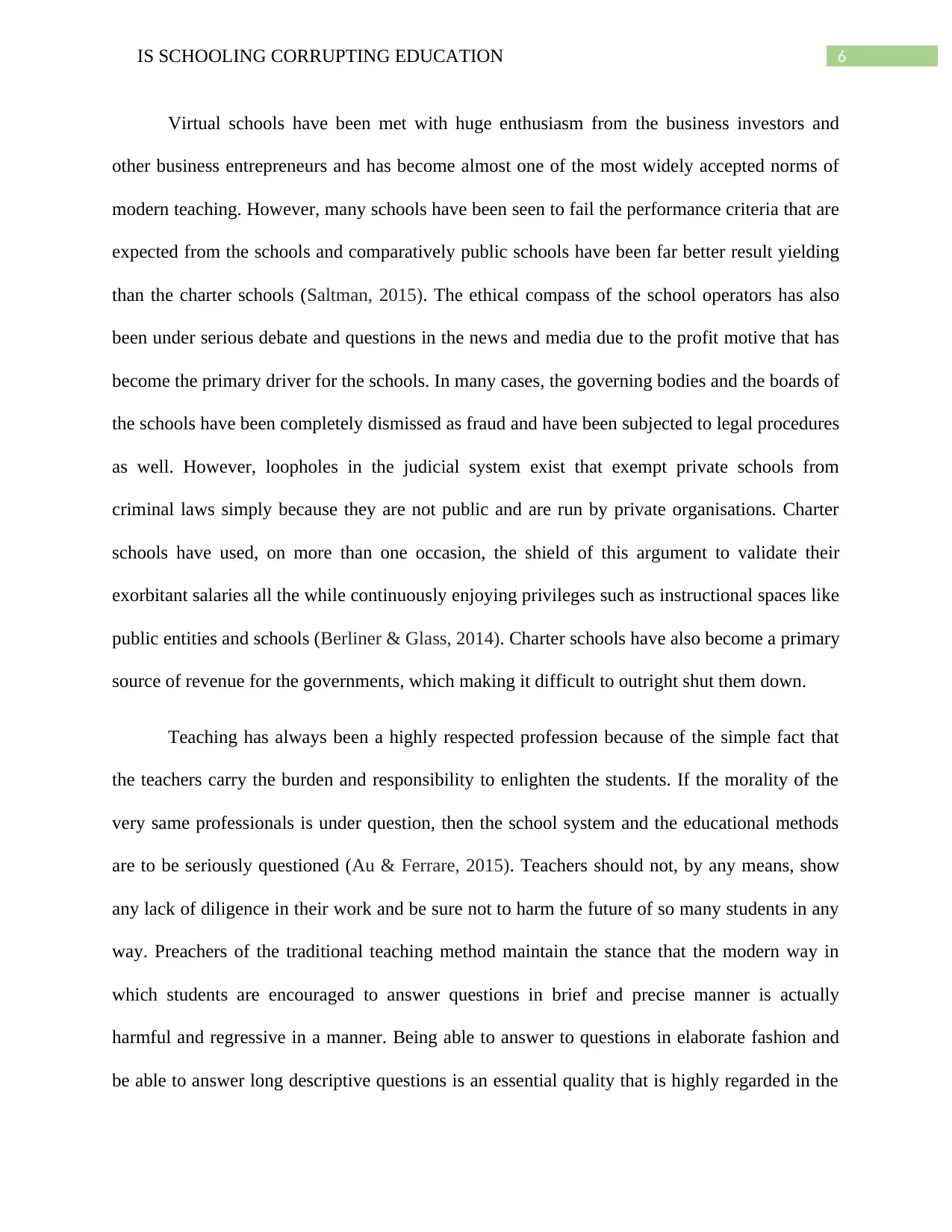
6IS SCHOOLING CORRUPTING EDUCATION
Virtual schools have been met with huge enthusiasm from the business investors and
other business entrepreneurs and has become almost one of the most widely accepted norms of
modern teaching. However, many schools have been seen to fail the performance criteria that are
expected from the schools and comparatively public schools have been far better result yielding
than the charter schools (Saltman, 2015). The ethical compass of the school operators has also
been under serious debate and questions in the news and media due to the profit motive that has
become the primary driver for the schools. In many cases, the governing bodies and the boards of
the schools have been completely dismissed as fraud and have been subjected to legal procedures
as well. However, loopholes in the judicial system exist that exempt private schools from
criminal laws simply because they are not public and are run by private organisations. Charter
schools have used, on more than one occasion, the shield of this argument to validate their
exorbitant salaries all the while continuously enjoying privileges such as instructional spaces like
public entities and schools (Berliner & Glass, 2014). Charter schools have also become a primary
source of revenue for the governments, which making it difficult to outright shut them down.
Teaching has always been a highly respected profession because of the simple fact that
the teachers carry the burden and responsibility to enlighten the students. If the morality of the
very same professionals is under question, then the school system and the educational methods
are to be seriously questioned (Au & Ferrare, 2015). Teachers should not, by any means, show
any lack of diligence in their work and be sure not to harm the future of so many students in any
way. Preachers of the traditional teaching method maintain the stance that the modern way in
which students are encouraged to answer questions in brief and precise manner is actually
harmful and regressive in a manner. Being able to answer to questions in elaborate fashion and
be able to answer long descriptive questions is an essential quality that is highly regarded in the
Virtual schools have been met with huge enthusiasm from the business investors and
other business entrepreneurs and has become almost one of the most widely accepted norms of
modern teaching. However, many schools have been seen to fail the performance criteria that are
expected from the schools and comparatively public schools have been far better result yielding
than the charter schools (Saltman, 2015). The ethical compass of the school operators has also
been under serious debate and questions in the news and media due to the profit motive that has
become the primary driver for the schools. In many cases, the governing bodies and the boards of
the schools have been completely dismissed as fraud and have been subjected to legal procedures
as well. However, loopholes in the judicial system exist that exempt private schools from
criminal laws simply because they are not public and are run by private organisations. Charter
schools have used, on more than one occasion, the shield of this argument to validate their
exorbitant salaries all the while continuously enjoying privileges such as instructional spaces like
public entities and schools (Berliner & Glass, 2014). Charter schools have also become a primary
source of revenue for the governments, which making it difficult to outright shut them down.
Teaching has always been a highly respected profession because of the simple fact that
the teachers carry the burden and responsibility to enlighten the students. If the morality of the
very same professionals is under question, then the school system and the educational methods
are to be seriously questioned (Au & Ferrare, 2015). Teachers should not, by any means, show
any lack of diligence in their work and be sure not to harm the future of so many students in any
way. Preachers of the traditional teaching method maintain the stance that the modern way in
which students are encouraged to answer questions in brief and precise manner is actually
harmful and regressive in a manner. Being able to answer to questions in elaborate fashion and
be able to answer long descriptive questions is an essential quality that is highly regarded in the
Paraphrase This Document
Need a fresh take? Get an instant paraphrase of this document with our AI Paraphraser
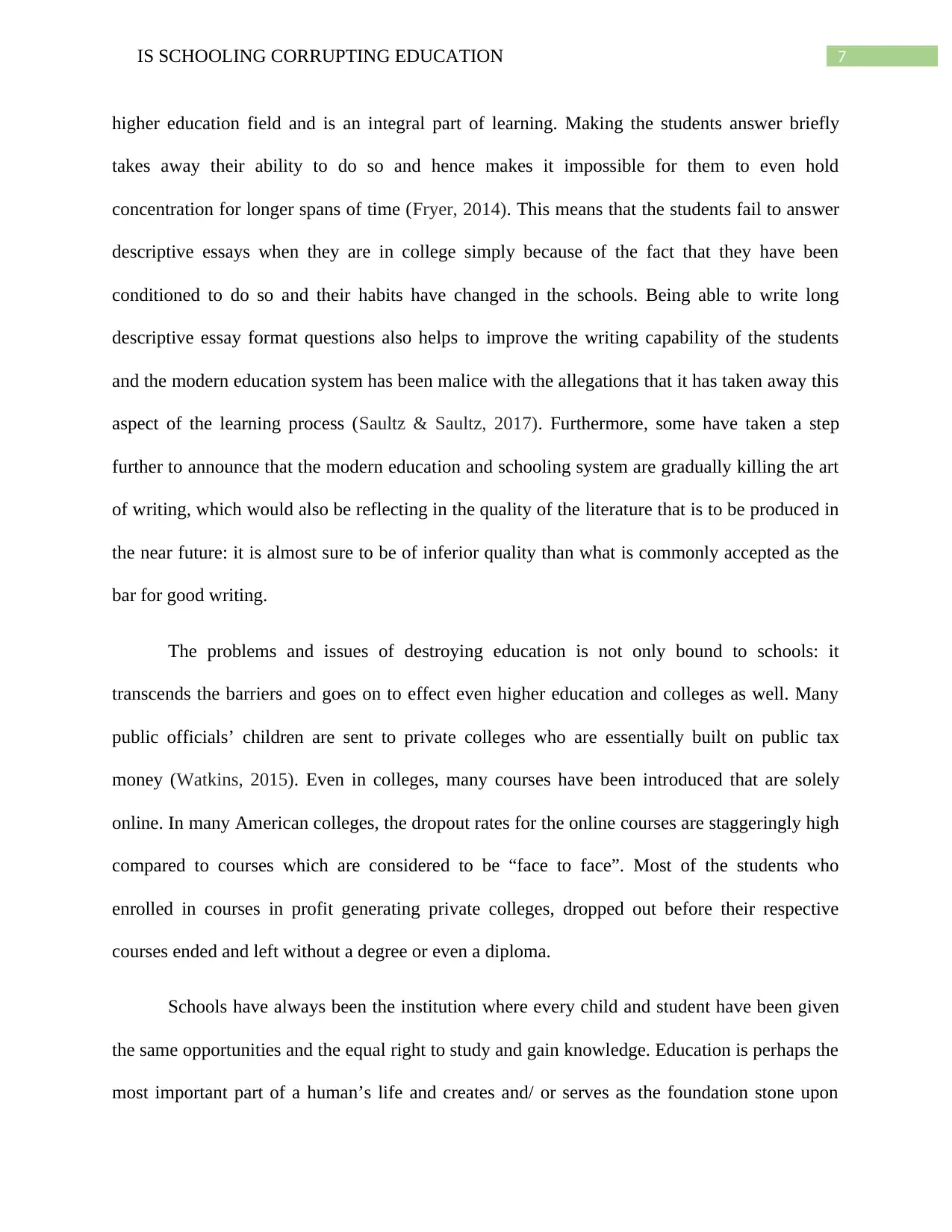
7IS SCHOOLING CORRUPTING EDUCATION
higher education field and is an integral part of learning. Making the students answer briefly
takes away their ability to do so and hence makes it impossible for them to even hold
concentration for longer spans of time (Fryer, 2014). This means that the students fail to answer
descriptive essays when they are in college simply because of the fact that they have been
conditioned to do so and their habits have changed in the schools. Being able to write long
descriptive essay format questions also helps to improve the writing capability of the students
and the modern education system has been malice with the allegations that it has taken away this
aspect of the learning process (Saultz & Saultz, 2017). Furthermore, some have taken a step
further to announce that the modern education and schooling system are gradually killing the art
of writing, which would also be reflecting in the quality of the literature that is to be produced in
the near future: it is almost sure to be of inferior quality than what is commonly accepted as the
bar for good writing.
The problems and issues of destroying education is not only bound to schools: it
transcends the barriers and goes on to effect even higher education and colleges as well. Many
public officials’ children are sent to private colleges who are essentially built on public tax
money (Watkins, 2015). Even in colleges, many courses have been introduced that are solely
online. In many American colleges, the dropout rates for the online courses are staggeringly high
compared to courses which are considered to be “face to face”. Most of the students who
enrolled in courses in profit generating private colleges, dropped out before their respective
courses ended and left without a degree or even a diploma.
Schools have always been the institution where every child and student have been given
the same opportunities and the equal right to study and gain knowledge. Education is perhaps the
most important part of a human’s life and creates and/ or serves as the foundation stone upon
higher education field and is an integral part of learning. Making the students answer briefly
takes away their ability to do so and hence makes it impossible for them to even hold
concentration for longer spans of time (Fryer, 2014). This means that the students fail to answer
descriptive essays when they are in college simply because of the fact that they have been
conditioned to do so and their habits have changed in the schools. Being able to write long
descriptive essay format questions also helps to improve the writing capability of the students
and the modern education system has been malice with the allegations that it has taken away this
aspect of the learning process (Saultz & Saultz, 2017). Furthermore, some have taken a step
further to announce that the modern education and schooling system are gradually killing the art
of writing, which would also be reflecting in the quality of the literature that is to be produced in
the near future: it is almost sure to be of inferior quality than what is commonly accepted as the
bar for good writing.
The problems and issues of destroying education is not only bound to schools: it
transcends the barriers and goes on to effect even higher education and colleges as well. Many
public officials’ children are sent to private colleges who are essentially built on public tax
money (Watkins, 2015). Even in colleges, many courses have been introduced that are solely
online. In many American colleges, the dropout rates for the online courses are staggeringly high
compared to courses which are considered to be “face to face”. Most of the students who
enrolled in courses in profit generating private colleges, dropped out before their respective
courses ended and left without a degree or even a diploma.
Schools have always been the institution where every child and student have been given
the same opportunities and the equal right to study and gain knowledge. Education is perhaps the
most important part of a human’s life and creates and/ or serves as the foundation stone upon
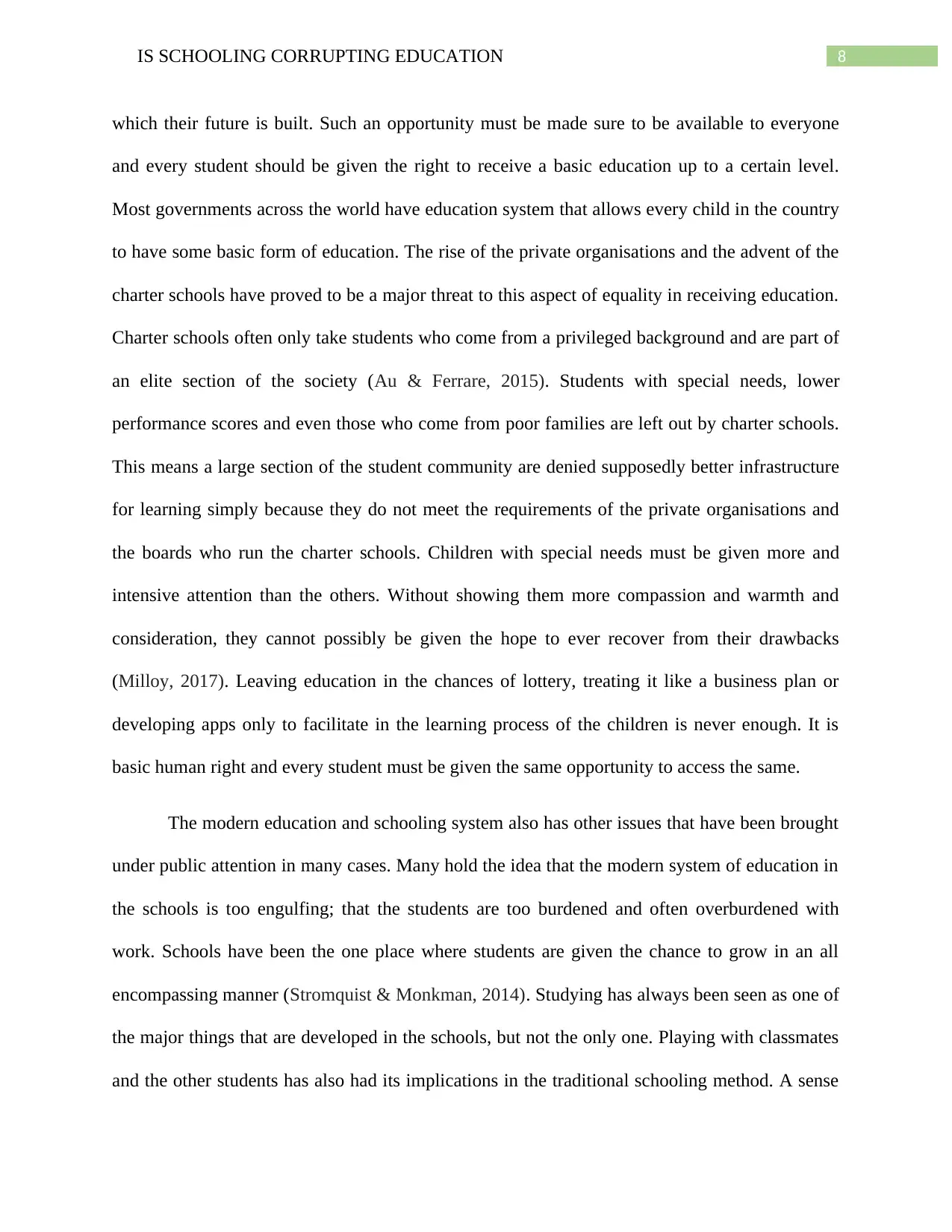
8IS SCHOOLING CORRUPTING EDUCATION
which their future is built. Such an opportunity must be made sure to be available to everyone
and every student should be given the right to receive a basic education up to a certain level.
Most governments across the world have education system that allows every child in the country
to have some basic form of education. The rise of the private organisations and the advent of the
charter schools have proved to be a major threat to this aspect of equality in receiving education.
Charter schools often only take students who come from a privileged background and are part of
an elite section of the society (Au & Ferrare, 2015). Students with special needs, lower
performance scores and even those who come from poor families are left out by charter schools.
This means a large section of the student community are denied supposedly better infrastructure
for learning simply because they do not meet the requirements of the private organisations and
the boards who run the charter schools. Children with special needs must be given more and
intensive attention than the others. Without showing them more compassion and warmth and
consideration, they cannot possibly be given the hope to ever recover from their drawbacks
(Milloy, 2017). Leaving education in the chances of lottery, treating it like a business plan or
developing apps only to facilitate in the learning process of the children is never enough. It is
basic human right and every student must be given the same opportunity to access the same.
The modern education and schooling system also has other issues that have been brought
under public attention in many cases. Many hold the idea that the modern system of education in
the schools is too engulfing; that the students are too burdened and often overburdened with
work. Schools have been the one place where students are given the chance to grow in an all
encompassing manner (Stromquist & Monkman, 2014). Studying has always been seen as one of
the major things that are developed in the schools, but not the only one. Playing with classmates
and the other students has also had its implications in the traditional schooling method. A sense
which their future is built. Such an opportunity must be made sure to be available to everyone
and every student should be given the right to receive a basic education up to a certain level.
Most governments across the world have education system that allows every child in the country
to have some basic form of education. The rise of the private organisations and the advent of the
charter schools have proved to be a major threat to this aspect of equality in receiving education.
Charter schools often only take students who come from a privileged background and are part of
an elite section of the society (Au & Ferrare, 2015). Students with special needs, lower
performance scores and even those who come from poor families are left out by charter schools.
This means a large section of the student community are denied supposedly better infrastructure
for learning simply because they do not meet the requirements of the private organisations and
the boards who run the charter schools. Children with special needs must be given more and
intensive attention than the others. Without showing them more compassion and warmth and
consideration, they cannot possibly be given the hope to ever recover from their drawbacks
(Milloy, 2017). Leaving education in the chances of lottery, treating it like a business plan or
developing apps only to facilitate in the learning process of the children is never enough. It is
basic human right and every student must be given the same opportunity to access the same.
The modern education and schooling system also has other issues that have been brought
under public attention in many cases. Many hold the idea that the modern system of education in
the schools is too engulfing; that the students are too burdened and often overburdened with
work. Schools have been the one place where students are given the chance to grow in an all
encompassing manner (Stromquist & Monkman, 2014). Studying has always been seen as one of
the major things that are developed in the schools, but not the only one. Playing with classmates
and the other students has also had its implications in the traditional schooling method. A sense
⊘ This is a preview!⊘
Do you want full access?
Subscribe today to unlock all pages.

Trusted by 1+ million students worldwide
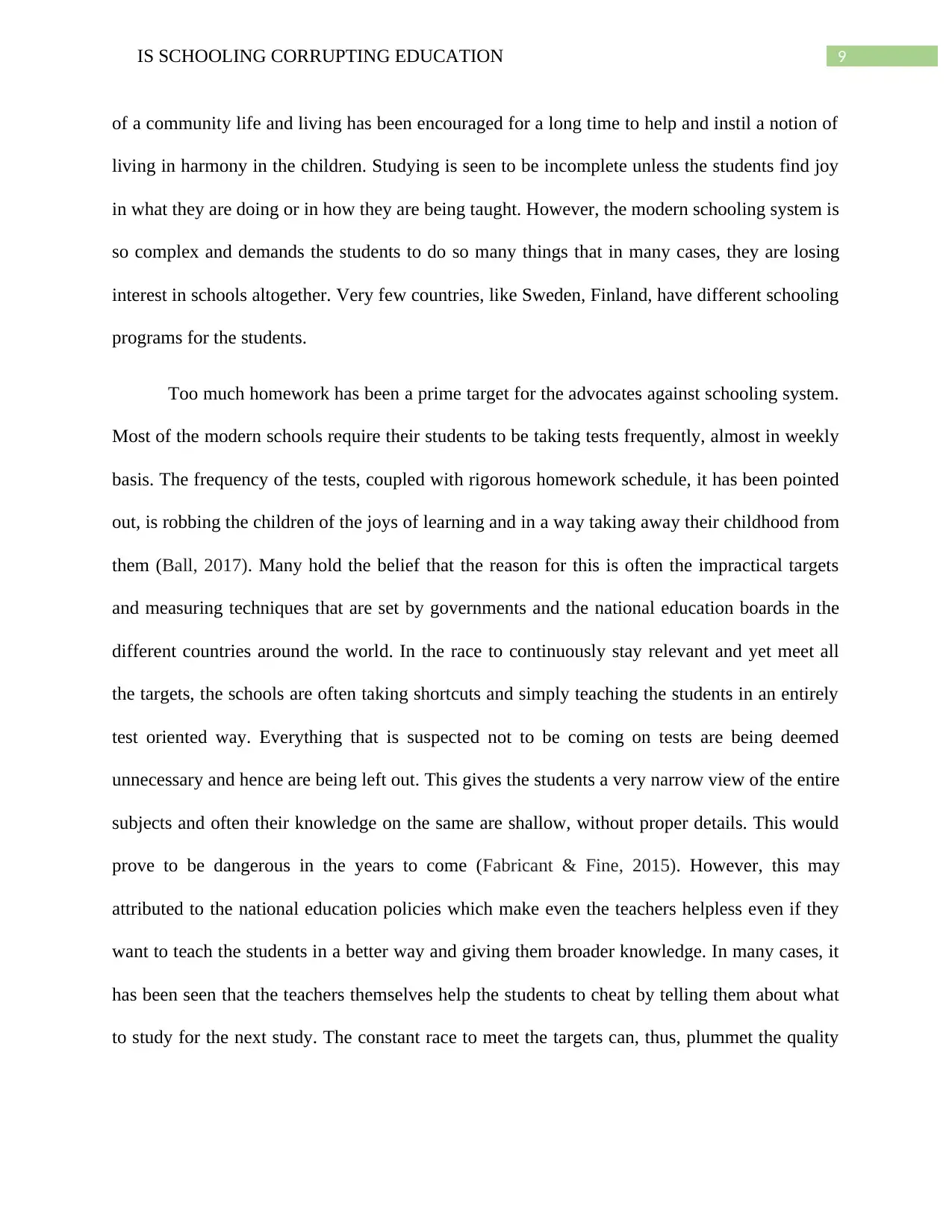
9IS SCHOOLING CORRUPTING EDUCATION
of a community life and living has been encouraged for a long time to help and instil a notion of
living in harmony in the children. Studying is seen to be incomplete unless the students find joy
in what they are doing or in how they are being taught. However, the modern schooling system is
so complex and demands the students to do so many things that in many cases, they are losing
interest in schools altogether. Very few countries, like Sweden, Finland, have different schooling
programs for the students.
Too much homework has been a prime target for the advocates against schooling system.
Most of the modern schools require their students to be taking tests frequently, almost in weekly
basis. The frequency of the tests, coupled with rigorous homework schedule, it has been pointed
out, is robbing the children of the joys of learning and in a way taking away their childhood from
them (Ball, 2017). Many hold the belief that the reason for this is often the impractical targets
and measuring techniques that are set by governments and the national education boards in the
different countries around the world. In the race to continuously stay relevant and yet meet all
the targets, the schools are often taking shortcuts and simply teaching the students in an entirely
test oriented way. Everything that is suspected not to be coming on tests are being deemed
unnecessary and hence are being left out. This gives the students a very narrow view of the entire
subjects and often their knowledge on the same are shallow, without proper details. This would
prove to be dangerous in the years to come (Fabricant & Fine, 2015). However, this may
attributed to the national education policies which make even the teachers helpless even if they
want to teach the students in a better way and giving them broader knowledge. In many cases, it
has been seen that the teachers themselves help the students to cheat by telling them about what
to study for the next study. The constant race to meet the targets can, thus, plummet the quality
of a community life and living has been encouraged for a long time to help and instil a notion of
living in harmony in the children. Studying is seen to be incomplete unless the students find joy
in what they are doing or in how they are being taught. However, the modern schooling system is
so complex and demands the students to do so many things that in many cases, they are losing
interest in schools altogether. Very few countries, like Sweden, Finland, have different schooling
programs for the students.
Too much homework has been a prime target for the advocates against schooling system.
Most of the modern schools require their students to be taking tests frequently, almost in weekly
basis. The frequency of the tests, coupled with rigorous homework schedule, it has been pointed
out, is robbing the children of the joys of learning and in a way taking away their childhood from
them (Ball, 2017). Many hold the belief that the reason for this is often the impractical targets
and measuring techniques that are set by governments and the national education boards in the
different countries around the world. In the race to continuously stay relevant and yet meet all
the targets, the schools are often taking shortcuts and simply teaching the students in an entirely
test oriented way. Everything that is suspected not to be coming on tests are being deemed
unnecessary and hence are being left out. This gives the students a very narrow view of the entire
subjects and often their knowledge on the same are shallow, without proper details. This would
prove to be dangerous in the years to come (Fabricant & Fine, 2015). However, this may
attributed to the national education policies which make even the teachers helpless even if they
want to teach the students in a better way and giving them broader knowledge. In many cases, it
has been seen that the teachers themselves help the students to cheat by telling them about what
to study for the next study. The constant race to meet the targets can, thus, plummet the quality
Paraphrase This Document
Need a fresh take? Get an instant paraphrase of this document with our AI Paraphraser
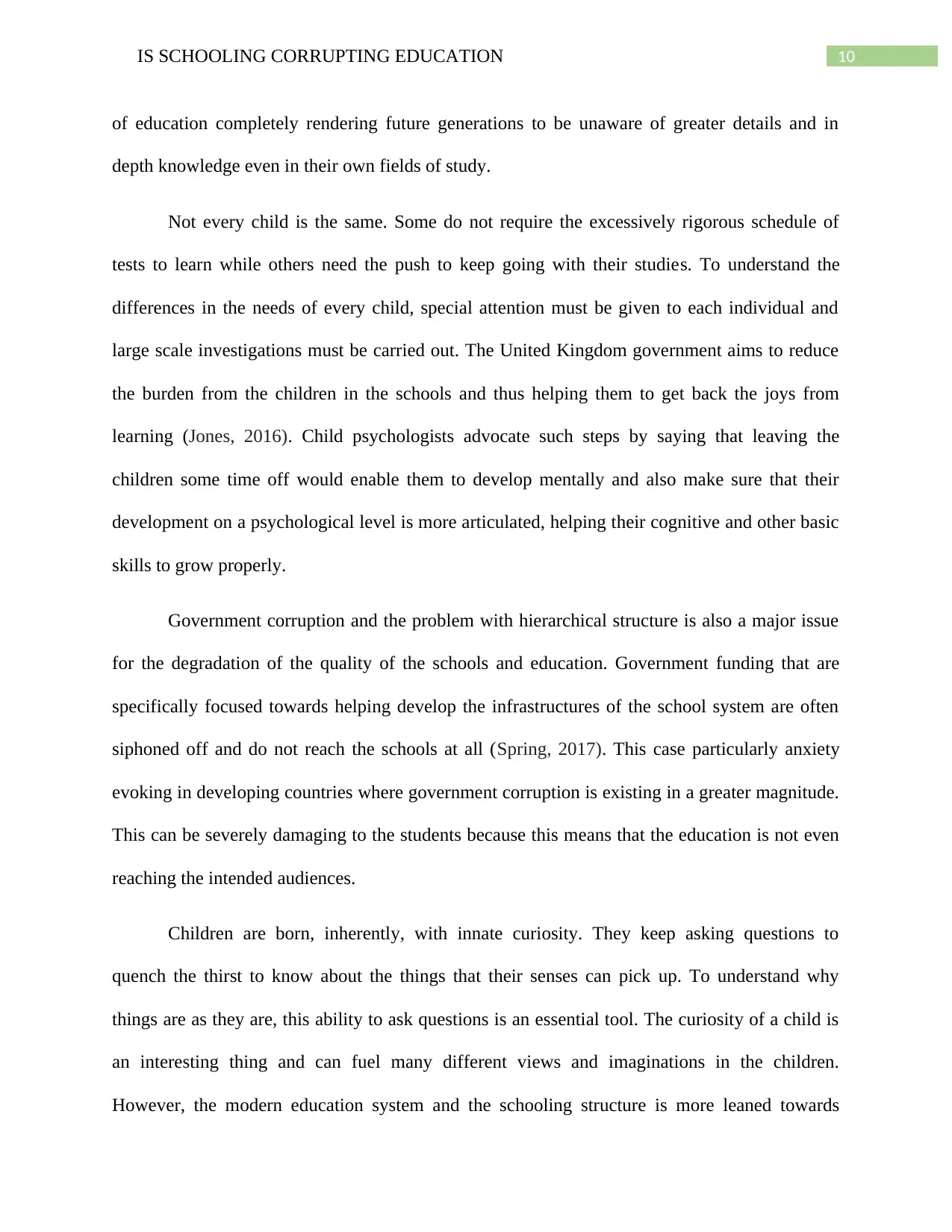
10IS SCHOOLING CORRUPTING EDUCATION
of education completely rendering future generations to be unaware of greater details and in
depth knowledge even in their own fields of study.
Not every child is the same. Some do not require the excessively rigorous schedule of
tests to learn while others need the push to keep going with their studies. To understand the
differences in the needs of every child, special attention must be given to each individual and
large scale investigations must be carried out. The United Kingdom government aims to reduce
the burden from the children in the schools and thus helping them to get back the joys from
learning (Jones, 2016). Child psychologists advocate such steps by saying that leaving the
children some time off would enable them to develop mentally and also make sure that their
development on a psychological level is more articulated, helping their cognitive and other basic
skills to grow properly.
Government corruption and the problem with hierarchical structure is also a major issue
for the degradation of the quality of the schools and education. Government funding that are
specifically focused towards helping develop the infrastructures of the school system are often
siphoned off and do not reach the schools at all (Spring, 2017). This case particularly anxiety
evoking in developing countries where government corruption is existing in a greater magnitude.
This can be severely damaging to the students because this means that the education is not even
reaching the intended audiences.
Children are born, inherently, with innate curiosity. They keep asking questions to
quench the thirst to know about the things that their senses can pick up. To understand why
things are as they are, this ability to ask questions is an essential tool. The curiosity of a child is
an interesting thing and can fuel many different views and imaginations in the children.
However, the modern education system and the schooling structure is more leaned towards
of education completely rendering future generations to be unaware of greater details and in
depth knowledge even in their own fields of study.
Not every child is the same. Some do not require the excessively rigorous schedule of
tests to learn while others need the push to keep going with their studies. To understand the
differences in the needs of every child, special attention must be given to each individual and
large scale investigations must be carried out. The United Kingdom government aims to reduce
the burden from the children in the schools and thus helping them to get back the joys from
learning (Jones, 2016). Child psychologists advocate such steps by saying that leaving the
children some time off would enable them to develop mentally and also make sure that their
development on a psychological level is more articulated, helping their cognitive and other basic
skills to grow properly.
Government corruption and the problem with hierarchical structure is also a major issue
for the degradation of the quality of the schools and education. Government funding that are
specifically focused towards helping develop the infrastructures of the school system are often
siphoned off and do not reach the schools at all (Spring, 2017). This case particularly anxiety
evoking in developing countries where government corruption is existing in a greater magnitude.
This can be severely damaging to the students because this means that the education is not even
reaching the intended audiences.
Children are born, inherently, with innate curiosity. They keep asking questions to
quench the thirst to know about the things that their senses can pick up. To understand why
things are as they are, this ability to ask questions is an essential tool. The curiosity of a child is
an interesting thing and can fuel many different views and imaginations in the children.
However, the modern education system and the schooling structure is more leaned towards
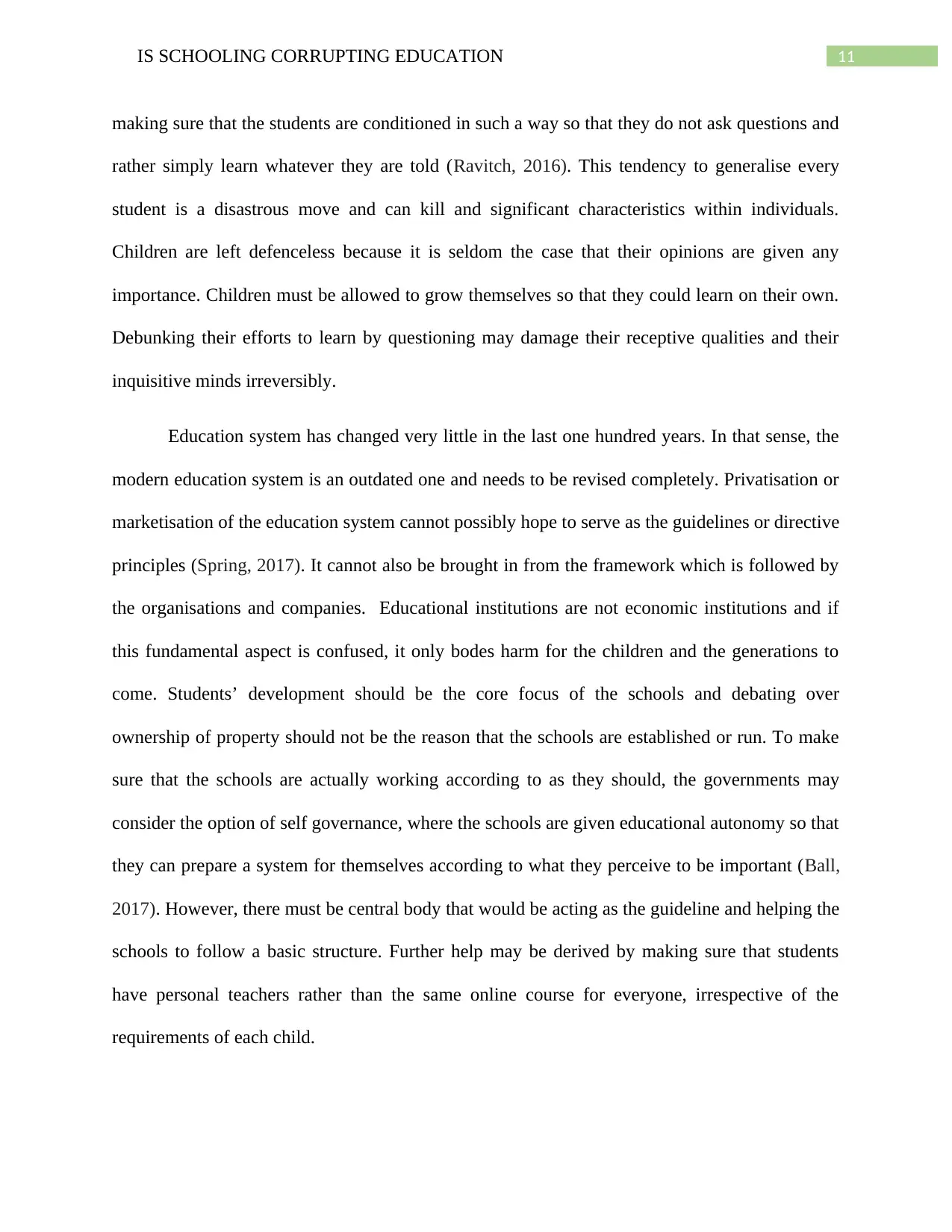
11IS SCHOOLING CORRUPTING EDUCATION
making sure that the students are conditioned in such a way so that they do not ask questions and
rather simply learn whatever they are told (Ravitch, 2016). This tendency to generalise every
student is a disastrous move and can kill and significant characteristics within individuals.
Children are left defenceless because it is seldom the case that their opinions are given any
importance. Children must be allowed to grow themselves so that they could learn on their own.
Debunking their efforts to learn by questioning may damage their receptive qualities and their
inquisitive minds irreversibly.
Education system has changed very little in the last one hundred years. In that sense, the
modern education system is an outdated one and needs to be revised completely. Privatisation or
marketisation of the education system cannot possibly hope to serve as the guidelines or directive
principles (Spring, 2017). It cannot also be brought in from the framework which is followed by
the organisations and companies. Educational institutions are not economic institutions and if
this fundamental aspect is confused, it only bodes harm for the children and the generations to
come. Students’ development should be the core focus of the schools and debating over
ownership of property should not be the reason that the schools are established or run. To make
sure that the schools are actually working according to as they should, the governments may
consider the option of self governance, where the schools are given educational autonomy so that
they can prepare a system for themselves according to what they perceive to be important (Ball,
2017). However, there must be central body that would be acting as the guideline and helping the
schools to follow a basic structure. Further help may be derived by making sure that students
have personal teachers rather than the same online course for everyone, irrespective of the
requirements of each child.
making sure that the students are conditioned in such a way so that they do not ask questions and
rather simply learn whatever they are told (Ravitch, 2016). This tendency to generalise every
student is a disastrous move and can kill and significant characteristics within individuals.
Children are left defenceless because it is seldom the case that their opinions are given any
importance. Children must be allowed to grow themselves so that they could learn on their own.
Debunking their efforts to learn by questioning may damage their receptive qualities and their
inquisitive minds irreversibly.
Education system has changed very little in the last one hundred years. In that sense, the
modern education system is an outdated one and needs to be revised completely. Privatisation or
marketisation of the education system cannot possibly hope to serve as the guidelines or directive
principles (Spring, 2017). It cannot also be brought in from the framework which is followed by
the organisations and companies. Educational institutions are not economic institutions and if
this fundamental aspect is confused, it only bodes harm for the children and the generations to
come. Students’ development should be the core focus of the schools and debating over
ownership of property should not be the reason that the schools are established or run. To make
sure that the schools are actually working according to as they should, the governments may
consider the option of self governance, where the schools are given educational autonomy so that
they can prepare a system for themselves according to what they perceive to be important (Ball,
2017). However, there must be central body that would be acting as the guideline and helping the
schools to follow a basic structure. Further help may be derived by making sure that students
have personal teachers rather than the same online course for everyone, irrespective of the
requirements of each child.
⊘ This is a preview!⊘
Do you want full access?
Subscribe today to unlock all pages.

Trusted by 1+ million students worldwide
1 out of 15
Related Documents
Your All-in-One AI-Powered Toolkit for Academic Success.
+13062052269
info@desklib.com
Available 24*7 on WhatsApp / Email
![[object Object]](/_next/static/media/star-bottom.7253800d.svg)
Unlock your academic potential
Copyright © 2020–2025 A2Z Services. All Rights Reserved. Developed and managed by ZUCOL.




